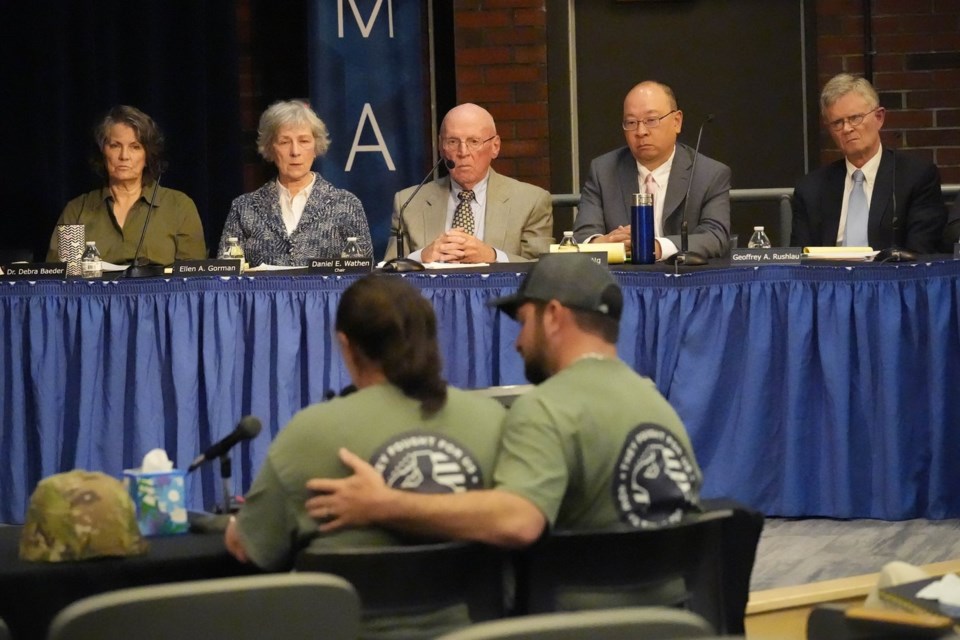LEWISTON, Maine (AP) — Both the Army Reserves and local police missed out on opportunities to intervene in a gunman’s psychiatric crisis and seize weapons from the spiraling reservist responsible for the , according to the final report released Tuesday by a special commission created to investigate the attacks, which killed 18 people.
The independent commission, which held more than a dozen public meetings, heard from scores of witnesses and reviewed thousands of pages of evidence, cited shortcomings by police for failing to take the gunman’s weapons and by the Army Reserves for failing to provide proper care for the 40-year-old gunman, Robert Card.
The commission, created by Gov. Janet Mills, a Democrat, announced its conclusions at Lewiston City Hall, less than 3 miles (5 kilometers) from the two sites where the shootings took place Oct. 25, 2023.
The 215-page report reiterated the panel’s conclusion from an interim finding in March that law enforcement had authority under the state’s yellow flag law to and put him in protective custody weeks before the shootings. But it also said the Army Reserves also should have done more, as well, to ensure care and deal with the weapons.
Daniel Wathen, chair of the commission, started his remarks by acknowledging the victims. “None of us can begin to imagine the pain you people have experienced on that terrible day,” he said.
He said it’s impossible know if the tragedy would have happened if police and the Army had done a better job. He also said police did their best to respond to the tragedy but noted that there was “utter chaos” when hundreds of police officers poured into the region.
The commission began its work a month after the mass shooting by Card, an Army reservist who killed 18 people at a bowling alley and a bar in Lewiston and then took his own life. Over nine months, there has been emotional testimony from family members and survivors of the shooting, law enforcement officials and U.S. Army Reserves personnel, and others.
The commission’s public hearings revealed the swift response by police to the shootings, but also the ensuing chaos during the intensive search for the gunman. Card’s sister testified at a hearing, her hand resting on his military helmet as she spoke. Kathleen Walker, whose husband, Jason, was killed while rushing at Card to try to stop him, said: “The system failed, and we can’t allow this to happen again.”
Family members and fellow reservists said Card had exhibited delusional and paranoid behavior months before the shootings. He was hospitalized by the Army during training in July 2023, but a commanding officer acknowledged to the commission that he didn’t check on Card’s compliance on follow-up care.
The starkest warning came in September when texted an Army supervisor, saying, “I believe he’s going to snap and do a mass shooting.” Card was found dead by his own hand after the search that followed the shootings.
Army officials conducted their own investigation after the shootings that Lt. Gen. Jody Daniels, then the chief of the Army Reserves, said found “a series of failures by unit leadership.” Three Army Reserve leaders were disciplined for dereliction of duty, , which noted communication failures within the chain of command and between military and civilian hospitals.
Maine’s legislature laws for the state, which has a tradition of hunting and firearms ownership, after the shootings. A three-day waiting period for gun purchases went into effect this month.
Wathen, the commission's chair, is a former chief justice of Maine’s highest court. The seven-member commission also included two former federal prosecutors, two additional former judges, the state’s former chief forensic psychologist, and a private psychiatrist who’s an executive at a psychiatric hospital.
___
Sharp reported from Portland, Maine.
Patrick Whittle And David Sharp, The Associated Press




